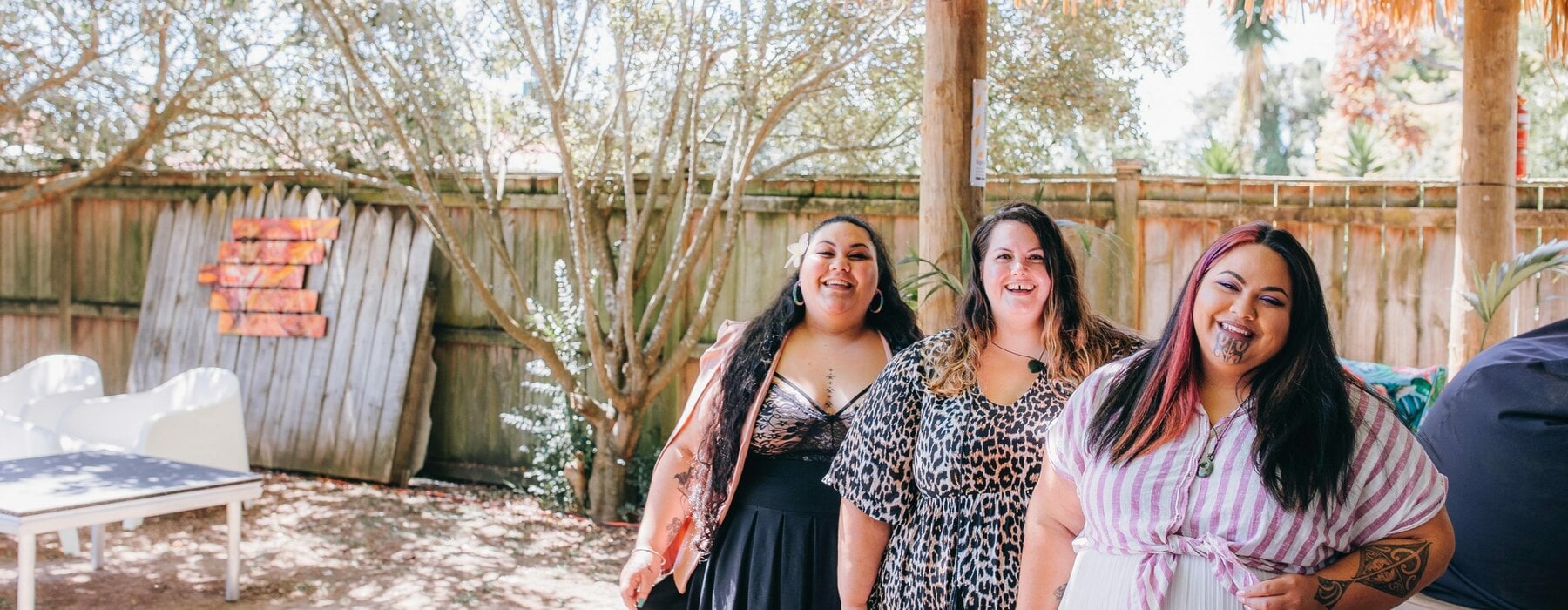Fat liberationists MahMah Timoteo, Meagan Kerr and Siobhan Tumai discuss social validation, access to fashion, healthcare equality and other important issues facing their community.
Social media
Ask any of these social media stars and they’ll tell you the best part of their work is connecting with other fat people. Siobhan helped MahMah come to a place of self-acceptance, and before that it was seeing Meagan online that helped Siobhan come to that place herself. For Meagan, it was seeing US model Tess Holliday online. Now, all three of them are inspiring thousands; collectively, they have more than 41,000 followers on Instagram.
“There’s that spark of hope when people see you just being yourself, being a fat woman in the world who loves fashion and who’s just living her best life,” Siobhan says. They all have stories of followers messaging them to tell them how they’ve changed their lives which, Meagan says, amidst all of the comments and messages they get from “douchebag dudes” hitting on them and fatphobic people abusing them, “is a reminder of why we do it”.
There’s that spark of hope when people see you just being yourself, being a fat woman in the world
Of course, social media stardom comes with its downsides – even beyond the negative comments. Quite often, they just want to clock out.
“The thing is, we’re forced to relive our trauma constantly,” says Meagan. “I’ve been to a lot of therapy, which is how I’m at the place I am with my body now, but still having to relive stuff and talk about it all the time. Instagram used to be my downtime and now I don’t get to do that.”
MahMah adds, “The other thing is, those messages we get are so amazing and beautiful, but also there’s a pressure to respond to every one, to always keep producing body-positive content or fat content and then you want to just tap out. If it was our job and we were getting paid for it, I’d get it. But everything we do, for the most part, is free mahi, free knowledge.
“We take time out of our own day to read the resources, to connect with other people; it doesn’t just come out of our arses. Or a lot of it’s lived experience that we choose to talk about and people really take advantage of that sometimes and just expect more and more.”
But it comes with its plus sides too – the most obvious of which being that, if it weren’t for social media, none of us would be talking right now. “That’s how we’re all here today,” says Siobhan.
And moments like these, MahMah explains, are why there’s always the thought in the back of her mind of, “If I tap out now, what opportunities do I miss out on?”
Plus, she says, “we can’t deny the fact that we get validation on social media. Every picture, every kind comment, every message – although, yeah, we’re doing it for other people – there is a sense of, ‘This makes me feel good’, especially after growing up with society telling you you’re a piece of s***, fat and ugly, and nobody will ever love you or want you.
“That validation is an aspect of social media because social media has been built for that; that’s why you get the notifications, the likes, the messages, the comments, the follows.”
Fat fashion
Did you know that in many stores around the country, plus-size clothes start at a size 12? Even City Chic – arguably New Zealand’s most well-known “plus-size” specialty store – ranges from a size 12 to only a 24 (or a 26, if you get lucky online).
That’s despite the fact the average women’s clothing size in New Zealand is a size 16. If you’re over a size 24 in this country, which many are, your options are pretty much a collection of blacks, beiges and busy florals from Kmart or The Warehouse. Past that, you’re stuck with either low-quality fast fashion or options which are wildly expensive and largely inaccessible to the average Kiwi.
“It shows us that we can’t look the way we want to look, we can’t be cute,” says MahMah. “It’s basically like, ‘We don’t want anyone to see you because you must feel so insecure about yourself that you’re only wanting to wear these colours and this fit and go hide away in your little fat-hole.”
“It’s about body privilege,” Siobhan adds. “You can literally walk into a mall, go to Glassons or wherever and pick something off the rack, you can try it on and if you like it, you can buy it. For us, none of that s*** is going to fit us.”
Contributing to fast fashion is something that pains them all.
“People just don’t understand,” MahMah says. “They’re like, ‘But why do you want all these clothes? Why do you need all these clothes?’ It’s like, ‘To feel human?’ There’s that feeling of knowing you’re not actually accepted, or ‘We don’t actually cater to you’.
“Do you know how many messages I get from people saying, ‘Do you know about this store?’ And I look, and it goes up to a size 22 or 24, and they know how big I am. They know I’m sitting at, minimum 28 to 32.”
That’s the trouble with plus-size clothes not actually being plus-size. People learn that “plus-size” is size 12 to 24 and “we have to reframe that”.
There’s a store in the UK called Yours Clothing, which caters for people up to a size 40 and, when MahMah first saw that, “I cried”.
“I was like, ‘That’s the future, 40 and beyond. The new size 16 is a size 24. We need to start thinking differently because the thing is, our bodies haven’t changed; we’ve existed like this forever it’s just now we’re like, ‘Listen to us, respect us, give cute s***”.
But there’s also real danger in downsizing plus-sizes, in which people who already have an anti-fat bias might find themselves at a mere size 12, suddenly being classed as “plus-size”.
“What happens is they start being like, ‘Oh my gosh, I’m in this plus-size range now’ and then they start developing eating disorders in order to get back [to
a straight size].”
Which leads us to our next issue…
Fat healthcare
What’s crazy is, the mindset of going through panic-driven crash diets to – quite literally – fit in, is totally acceptable… if you’re fat.
“If you’re a size 10 and you do that, people go, ‘Oh f ***, warning sign’. If you’re a size 28-30 and you do it, people applaud you,” says Meagan.
“Eating disorders are encouraged when you’re fat,” adds MahMah. “They’re promoted”.
“Unless you have a good doctor,” Meagan counters – but we all know that’s a rare thing for a fat person to find.
All three women now refuse to step on the scales at home or even in the doctor’s office – unless their weight is directly relevant, like when calculating a medicine dosage – because, as Siobhan puts it, “numbers are a colonial device to make us all feel like s***”.
“If I have to, I step on the scales,” says MahMah, “but I do not ever look at the number because it’s a f ***ing number. It means nothing”.
“You have to really advocate hard for yourself,” Meagan says of seeking health care. “There are so many things that are overlooked for fat people and when we talk about poor outcomes and higher incidences of things for fat people, I honestly don’t believe that they are higher, I think they’re just ignored and picked up later at a much worse stage.”
Why? Because fat people avoid going to the doctor. MahMah has heard from followers who haven’t been for nearly a decade, because they’re “too scared”.
“They would rather suffer than have to face what they face when they go the doctor,” she says. “We’re being denied proper health care that we deserve.”
At the end of the day, Siobhan adds, it’s simple: “You deserve to be treated with love and respect, no matter what your health status, no matter what your body size, no matter what your ability, no matter your race or ethnicity, no matter what religion… unless you’re a white supremacist or a homophobe!”








